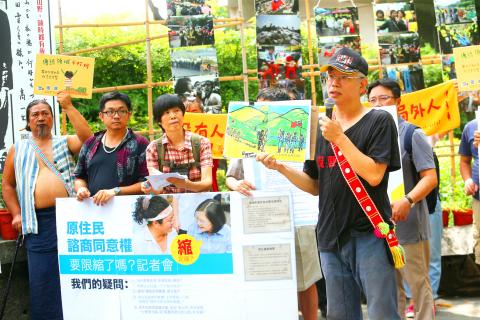Aboriginal rights advocates yesterday protested government plans that they said would reduce Aborigines’ land rights at a rally near the Presidential Office Building in Taipei, calling President Tsai Ing-wen’s (蔡英文) promise of transitional justice a lie.
On Aug. 1, the Council of Indigenous Peoples told non-Aboriginal residents of Nantou’s Yuchih Township (魚池) that it is planning to limit Aborigines’ traditional land rights after they protested against the Thao people’s newly-designated traditional territory in the township, said Salone Ishahavut, a Bunun professor of indigenous development at National Chi Nan University.
The council in June announced that more than 8,000 hectares of land in the township would be designated as the Thao people’s traditional territory.

Photo: CNA
According to the council’s current guidelines on traditional territories, any land development, wildlife conservation or anthropological projects in such areas must be approved by the Aboriginal community.
In the guidelines that the council proposed on Aug. 1, consent from local Aboriginal communities would no longer be necessary for anthropological research and land development projects, except if they require environmental impact assessments, Salone said.
According to Article 5 of the Environmental Impact Assessment Act (環境影響評估法), land development projects that require environmental impact assessments include high-rises, factories, roads, mines, water storage and drainage systems, recreational areas, sports fields, power plants, cultural, educational and medical facilities, and use of land for agriculture and forestry.
The council also proposed that, when Aboriginal consent is necessary, it would hold a vote among local Aborigines, instead of allowing the local tribal congress to decide, she said, adding that this could render the tribal congress powerless in such matters.
This is ironic considering that earlier on that day, Tsai gave a speech to the Austronesian Forum at Taipei’s Grand Hotel in which she said that she would seek to bring about reconciliation between different ethnic groups, she added.
Aug. 1 is also the day on which Tsai apologized to the Aboriginal peoples on behalf of the government two years ago, promising transitional justice for Aborigines, who have been oppressed for decades, she said.
The proposed changes to the guidelines were never submitted to the Indigenous Historical Justice and Transitional Justice Committee established for that purpose on Tsai’s orders on Aug. 1, 2016, she said.
Moreover, the government decided to discuss the draft guidelines with non-Aboriginal residents first, instead of involving Thao people in the area, she said.
“Historical records show that the Thao people used to own more than 70,000 hectares of land in the area, but the more than 700 Thao people in the area today are not greedy. They only applied to have 20,000 hectares,” she said. “Because of the disputes with other residents, the council has convinced them to accept just 8,000 hectares for now.”
The government’s policies on Aboriginal rights have been shockingly disappointing since Tsai’s apology two years ago, Fu Jen Catholic University law professor Wu Hao-jen (吳豪人) said.
While Taiwan has very progressive laws regarding Aboriginal rights, they are rarely enforced, he said, adding that Aboriginal peoples’ land rights are protected by the Indigenous Peoples Basic Act (原住民族基本法) and trying to curtail those rights through guidelines is against the law.

Chinese Nationalist Party (KMT) Chairman Eric Chu (朱立倫), spokeswoman Yang Chih-yu (楊智伃) and Legislator Hsieh Lung-chieh (謝龍介) would be summoned by police for questioning for leading an illegal assembly on Thursday evening last week, Minister of the Interior Liu Shyh-fang (劉世芳) said today. The three KMT officials led an assembly outside the Taipei City Prosecutors’ Office, a restricted area where public assembly is not allowed, protesting the questioning of several KMT staff and searches of KMT headquarters and offices in a recall petition forgery case. Chu, Yang and Hsieh are all suspected of contravening the Assembly and Parade Act (集會遊行法) by holding

PRAISE: Japanese visitor Takashi Kubota said the Taiwanese temple architecture images showcased in the AI Art Gallery were the most impressive displays he saw Taiwan does not have an official pavilion at the World Expo in Osaka, Japan, because of its diplomatic predicament, but the government-backed Tech World pavilion is drawing interest with its unique recreations of works by Taiwanese artists. The pavilion features an artificial intelligence (AI)-based art gallery showcasing works of famous Taiwanese artists from the Japanese colonial period using innovative technologies. Among its main simulated displays are Eastern gouache paintings by Chen Chin (陳進), Lin Yu-shan (林玉山) and Kuo Hsueh-hu (郭雪湖), who were the three young Taiwanese painters selected for the East Asian Painting exhibition in 1927. Gouache is a water-based

Taiwan would welcome the return of Honduras as a diplomatic ally if its next president decides to make such a move, Minister of Foreign Affairs Lin Chia-lung (林佳龍) said yesterday. “Of course, we would welcome Honduras if they want to restore diplomatic ties with Taiwan after their elections,” Lin said at a meeting of the legislature’s Foreign Affairs and National Defense Committee, when asked to comment on statements made by two of the three Honduran presidential candidates during the presidential campaign in the Central American country. Taiwan is paying close attention to the region as a whole in the wake of a

OFF-TARGET: More than 30,000 participants were expected to take part in the Games next month, but only 6,550 foreign and 19,400 Taiwanese athletes have registered Taipei city councilors yesterday blasted the organizers of next month’s World Masters Games over sudden timetable and venue changes, which they said have caused thousands of participants to back out of the international sporting event, among other organizational issues. They also cited visa delays and political interference by China as reasons many foreign athletes are requesting refunds for the event, to be held from May 17 to 30. Jointly organized by the Taipei and New Taipei City governments, the games have been rocked by numerous controversies since preparations began in 2020. Taipei City Councilor Lin Yen-feng (林延鳳) said yesterday that new measures by